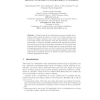Free Online Productivity Tools
i2Speak
i2Symbol
i2OCR
iTex2Img
iWeb2Print
iWeb2Shot
i2Type
iPdf2Split
iPdf2Merge
i2Bopomofo
i2Arabic
i2Style
i2Image
i2PDF
iLatex2Rtf
Sci2ools
GECCO
2003
Springer
2003
Springer
Hybrid Networks of Evolutionary Processors
Abstract. A hybrid network of evolutionary processors consists of several processors which are placed in nodes of a virtual graph and can perform one simple operation only on the words existing in that node in accordance with some strategies. Then the words which can pass the output filter of each node navigate simultaneously through the network and enter those nodes whose input filter was passed. We prove that these networks with filters defined by simple random-context conditions, used as language generating devices, are able to generate all linear languages in a very efficient way, as well as non-context-free languages. Then, when using them as computing devices, we present two linear solutions of the Common Algorithmic Problem.
Evolutionary Processors | GECCO 2003 | Language Generating Devices | Simple Random-context Conditions |
Related Content
| Added | 06 Jul 2010 |
| Updated | 06 Jul 2010 |
| Type | Conference |
| Year | 2003 |
| Where | GECCO |
| Authors | Carlos Martín-Vide, Victor Mitrana, Mario J. Pérez-Jiménez, Fernando Sancho-Caparrini |
Comments (0)

